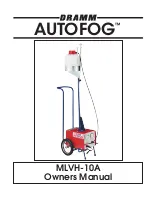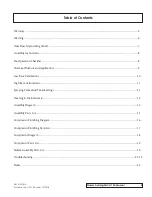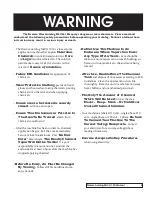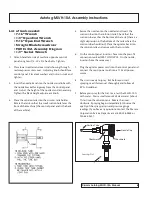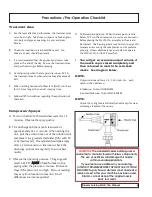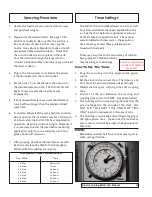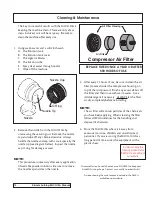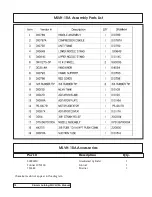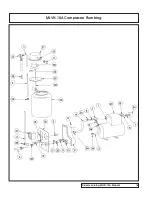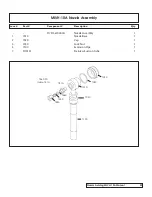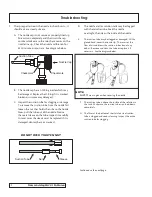
Precautions / Pre-Operation Checklist
D. Cold weather operation: When the temperature falls
below 32°F run the compressor in a warm environment
before placing the MLVH-10A assembly in the area to
be treated. The bearing grease may harden in very cold
temperatures causing the compressor to not preform
properly. Unless absolutely necessary, do not operate
the MLVH-10A in sub 25°F weather.
E.
You will get an accurate output volume if
the nozzle cap is closed completely and
then returned to match the red check
marks. See diagram below.
NOTE:
Output volume will vary 2.5 - 3.0 cc/min. for each
notch in the nozzle cap.
•Clockwise: Output INCREASES
•Counterclockwise: Output DECREASES
NOTE:
Check the O-ring located inside the nozzle cap for wear
or damage. Replace if necessary
Dramm Autofog MLVH-10A Manual
8
A. For the most effective performance, the treatment area
must be air tight. Take time to repair any broken glass,
torn poly and gaps or openings in vents and door
frames.
B. The entire treatment area should be vacant. No
humans or pets should be present.
C. It is recommended that the application process take
place at the end of the day. Secure the treatment area
and post hazard signs
before
spraying.
D. Avoid spraying when the temperature is over 85°F in
the treatment area or when relative humidity exceeds
85%.
E. When utilizing horizontal airflow fans (HAF), run them
for 1/2 hour longer than actual spraying time.
F. Follow all EPA Guidelines regarding the application of
chemicals.
A. Test run the MLVH-10A with clear water for 1-2
minutes. Observe the spray quality.
B. The discharge volume rate of clean water is
approximately 45 cc / minute. When testing the
unit, pull the suction hose out of the solution tank
and place it in a graduated cylinder (fill it with 90
cc of clean water). The cylinder should be empty
after a 2 minute test run. Be sure to check the
discharge volume rate regularly to assure best
results.
C. Observe the operating pressure. The gauge will
read 14-23 PSI. NOTE: Check for leaks in the
piping when the pressure is too low. Eliminate
clogs if the pressure is too high. Pressure readings
may vary from location to location. Small
differences are inconsequential.
Compressor/Sprayer
Treatment Area
WARNING:
The standard model Autofog uses a
nozzle that is manufactured with brass components.
The use of oxidizers will damage this nozzle
within several applications.
If you plan to use oxidizers in your Autofog,
CONTACT DRAMM BEFORE THE FIRST USE OF YOUR
MACHINE
to purchase a stainless steel nozzle at a
reduced cost. After your machine has been used,
Dramm cannot accept the original nozzle
back for credit.
Summary of Contents for Autofog MLVH-10A
Page 1: ...AUTOFOG MLVH 10A Owners Manual...
Page 12: ...Dramm Autofog MLVH 10A Manual 14 MLVH 10A Assembly Diagram...
Page 14: ...Dramm Autofog MLVH 10A Manual 16 MLVH 10A Compressor Plumbing...
Page 15: ...MLVH 10A Compressor Plumbing Parts List 17 Dramm Autofog MLVH 10A Manual...
Page 16: ...MLVH 10A Compressor Diagram Dramm Autofog MLVH 10A Manual 18...
Page 17: ...MLVH 10A Compressor Parts List 19 Dramm Autofog MLVH 10A Manual...

